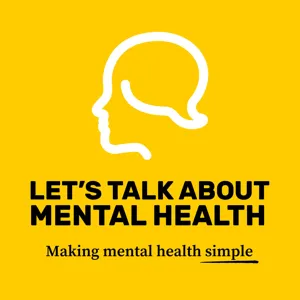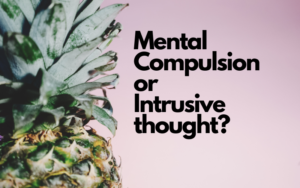Podcast Summary
Understanding Obsessive Compulsive Disorder (OCD): OCD is a distinct mental health condition with specific treatments, not just about anxiety or perfectionism. Psychotherapy offers valuable skills for managing thoughts and behaviors for all individuals.
Obsessive Compulsive Disorder (OCD) is a mental health condition characterized by intrusive thoughts and repetitive behaviors, often used as a response to relieve mental stress. However, giving in to these compulsions only reinforces the cycle and makes the condition stronger. It's important to understand that OCD is not just about being anxious or perfectionistic, but a distinct disorder that requires specific treatment. Psychotherapy for OCD offers valuable insights into dealing with unwanted thoughts and developing a crucial skill for all individuals: learning to manage and not give in to obsessions. The neuroscience behind OCD reveals it to be a disorder of attention, where certain thoughts dominate the mind, leading to compulsive behaviors that can sometimes cause harm. Understanding OCD and its unique treatment approach can provide valuable tools for managing thoughts and behaviors for everyone.
Understanding OCD: Separating Thoughts from Actions: Cognitive-behavioral therapy (CBT) helps 83% of people with OCD learn to separate their thoughts from actions, enabling them to act independently and avoid harmful coping mechanisms.
Obsessive-Compulsive Disorder (OCD) is characterized by intrusive thoughts and compulsions. Obsessions are unwanted thoughts that can lead to compulsive behaviors. These thoughts can be about contamination or danger, among other things. The most important aspect of treating OCD is teaching individuals how to separate their thoughts from their actions. This skill, known as cognitive-behavioral therapy (CBT), helps approximately 83% of people with OCD. By learning to not be controlled by their thoughts and feelings, individuals can avoid engaging in harmful coping mechanisms and instead act independently. This skill is beneficial for everyone as it helps us resist giving in to internal impulses that may lead to negative consequences. The ultimate goal of OCD treatment is to help individuals become more disciplined in their thoughts and actions.
Understanding OCD and OCPD: Two Different Conditions: OCD involves intrusive thoughts and compulsive behaviors, while OCPD is a personality trait with a need for control, orderliness, and perfectionism. Distinguishing between the two is crucial for effective treatment.
Obsessive-Compulsive Disorder (OCD) and Obssessive Compulsive Personality Disorder (OCPD) are two distinct mental health conditions. OCD is characterized by intrusive, unwanted thoughts (obsessions) and repetitive behaviors (compulsions) that a person feels driven to perform. These thoughts can revolve around fear of harm or contamination, among other things. OCD is ego-dystonic, meaning that individuals with OCD often recognize their thoughts as irrational and unwanted. On the other hand, OCPD is not a disorder but a personality trait. People with OCPD have a need for control, orderliness, and perfectionism. They genuinely believe that their way is the right way, and they can become upset when things don't meet their expectations. OCPD is ego-syntonic, meaning that individuals with OCPD do not view their traits as problematic. It's essential to distinguish between OCD and OCPD because they require different treatments. While medication and therapy can help manage the symptoms of OCD, OCPD typically responds better to psychotherapy and self-help strategies. By understanding the differences between these conditions, we can better support individuals who are struggling and ensure they receive the appropriate care.
Understanding OCD: Obsessions and Compulsions: OCD is a disorder characterized by intrusive obsessions and compulsive behaviors that provide temporary relief from anxiety caused by the obsessions.
Obsessive-Compulsive Disorder (OCD) is characterized by intrusive and often severe obsessions, which can impair focus, and compulsions, which are repetitive behaviors that provide temporary relief from the mental stress caused by the obsessions. The shoes discussed earlier serve as a metaphor for the importance of organization and order, which can be an obsession for some individuals with OCD. Obsessions can take various forms, such as contamination, symmetry, thoughts of danger, and forbidden thoughts, and they can be intrusive and impair focus. Compulsions, on the other hand, are illogical behaviors that individuals feel compelled to perform, even though they may recognize that they don't make sense. The compulsions provide temporary relief from the anxiety caused by the obsessions. For instance, a patient might repeat a mental prayer seven times to prevent danger during travel. The individual may understand that the prayer has no logical connection to the safety of the journey, but still feels compelled to perform it to reduce anxiety. Overall, OCD is a disorder that causes significant distress and impairment in daily life due to the presence of both obsessions and compulsions.
Understanding OCD's cycle of thoughts and behaviors: OCD is characterized by intrusive thoughts and repetitive behaviors, driven by the corticostriatal thalamic circuit, leading to a vicious cycle of mental distress and compulsions, impacting daily life and well-being.
Obsessive-Compulsive Disorder (OCD) is characterized by intrusive, unwanted thoughts (obsessions) and repetitive behaviors or mental acts (compulsions) that individuals engage in to reduce their distress. These thoughts and behaviors form a cycle that can become increasingly difficult to break. The root cause of OCD lies in the corticostriatal thalamic circuit in the brain, which forms a loop that provides a benefit to the individual. However, individuals with OCD may feel ashamed or distressed about their thoughts, leading them to engage in compulsions as a way to alleviate the mental distress. Over time, the more an individual gives in to their compulsions, the stronger they become, creating a vicious cycle. This cycle can significantly impact an individual's daily life and overall well-being. Understanding the nature of OCD and the role of the corticostriatal thalamic circuit can help in developing effective treatment strategies.
Learning to tolerate negative emotions in OCD treatment: In treating OCD, the focus is on helping individuals tolerate their negative emotions and resist compulsions, rather than addressing the content of the obsessions directly.
In the treatment of Obsessive-Compulsive Disorder (OCD), the focus is not on the content of the obsessions, but rather on helping individuals tolerate their negative emotions and resist compulsions. This approach, which is rooted in ancient spiritual traditions, aims to separate actions from thoughts and teaches individuals to endure the discomfort that arises from their obsessions, rather than engaging in harmful behaviors to alleviate them. By learning to tolerate negative emotions, individuals can break free from the cycle of OCD and improve their overall well-being.
Understanding Obsessive-Compulsive Disorder: OCD is characterized by intrusive, unwanted thoughts and compulsions to relieve anxiety. Misunderstandings can lead to misdiagnosis and ineffective treatments. It's crucial to recognize that OCD isn't about control, but managing thoughts and anxiety, and avoidance strategies can limit experiences.
Obsessive-Compulsive Disorder (OCD) is more than just being a control freak or having excessive anxiety. It's characterized by intrusive, persistent thoughts that are unwanted and ego dystonic, leading to compulsions as a way to relieve the obsession. People with OCD often build walls around their lives due to fear of triggering their OCD, causing them to miss out on opportunities. Misunderstandings about OCD can lead to misdiagnosis and ineffective treatments. It's essential to recognize that OCD is not about control, but about managing unwanted thoughts and the resulting anxiety. Avoidance strategies, even if they seem like coping mechanisms, can ultimately limit one's experiences and opportunities in life.
Masking the true nature of OCD with shame and harmful coping mechanisms: Individuals with OCD may hide their condition due to shame and engage in harmful behaviors to cope with intrusive thoughts. Psychotherapy helps individuals learn healthier ways to manage mental distress and avoid reinforcing negative patterns.
Obsessive-Compulsive Disorder (OCD) can lead individuals to avoid certain parts of life due to intrusive thoughts and resulting shame, which can mask the true nature of the condition. These feelings of shame and badness can lead to harmful behaviors as a way to cope with internal discomfort. The outside actions, while providing temporary relief, ultimately reinforce negative patterns and reinforce the reward circuitry in the brain. In psychotherapy for OCD, the focus is on teaching individuals that they can take actions in the outside world to alleviate mental distress, but it's essential to avoid reinforcing negative behaviors. Instead, individuals can learn healthier ways to cope with internal discomfort and challenge the negative thoughts that contribute to the shame cycle. The skills learned in OCD therapy can benefit the general population by teaching effective ways to manage mental distress and improve overall well-being.
Understanding OCD: Obsessions and Compulsions: OCD is a mental health condition causing distress through intrusive thoughts and repetitive behaviors. Treatment like CBT can help manage symptoms and improve quality of life. Mental health awareness and neuroscience insights offer valuable perspectives.
Obsessive-Compulsive Disorder (OCD) is a mental health condition characterized by recurring and intrusive thoughts (obsessions) and repetitive behaviors (compulsions). These patterns cause significant distress and interfere with daily life. OCD can be devastating, leading to isolation, anxiety, and even depression. However, there is hope. Treatment, such as cognitive-behavioral therapy (CBT), can help individuals learn to manage their symptoms and improve their overall quality of life. It's important to remember that everyone can benefit from understanding OCD and the importance of mental health awareness. Additionally, the neuroscience and various perspectives on OCD, including psychotherapy and psychoanalytic approaches, offer valuable insights into this complex condition.






 Hello there
Hello there